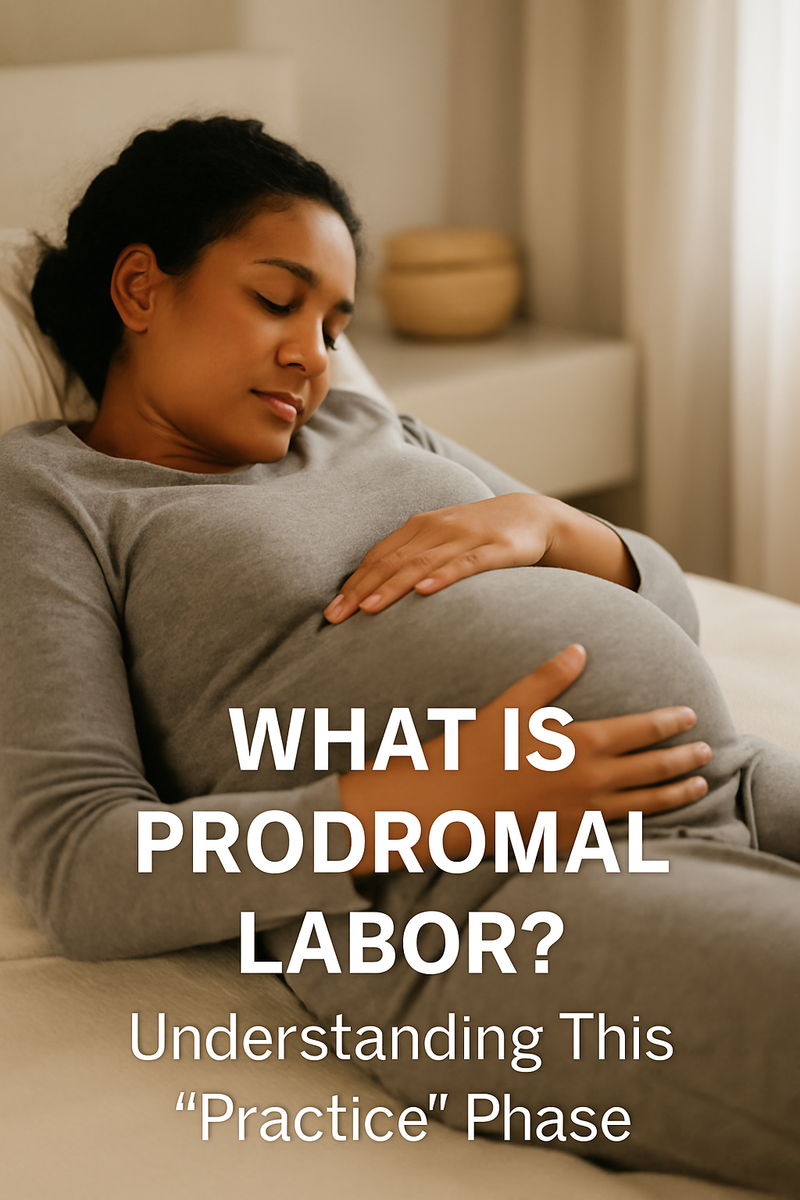What Is Prodromal Labor? Understanding This “Practice Labor” Phase and How to Survive It
Hey there, Mama 💛
As your due date gets closer, there's something important we need to talk about that doesn’t always get the attention it deserves: prodromal labor.
You’ve probably heard plenty about Braxton Hicks contractions—those mild tightenings that come and go—but not everyone gets the heads-up about this phase. Some people call it “false labor,” but we don’t love that term. There’s nothing false about what your body is doing.
As birth doulas serving Greensboro, Burlington, and Chapel Hill, NC, we want you to feel confident and equipped. So let’s explore what prodromal labor is and how to cope if it becomes part of your story.
So, What Is Prodromal Labor?
Prodromal labor is a stage of labor that mimics early labor, but without the steady progression toward birth. It involves real contractions —sometimes uncomfortable, sometimes painful—that may occur every 5 to 30 minutes, often at regular intervals.
These contractions can stick around for hours… or days… or even weeks. But they don’t intensify or get closer together, which means they’re not quite the “real deal” yet.
Your body isn’t malfunctioning—this is your muscles rehearsing. It’s a warm-up, and for some mothers, it’s also nature’s way of helping baby move into a better position.
Prodromal labor can happen to any mama—regardless of if this is their first baby, or sixth!
How Is This Different From Early Labor?
Here’s the tricky part: Prodromal labor can feel exactly like early labor.
You may notice:
Regular contractions
Lower backache
Cramping or nausea
Feeling “off” emotionally or physically
But here’s the key difference:
In early labor, contractions grow stronger, longer, and closer together.
In prodromal labor, they stay steady—or even fade away.
No wonder so many families go to the hospital only to be sent home. If that’s already happened to you—please know it’s normal and it doesn’t mean anything is wrong. It just means your body’s doing some early prep work.
Does Everyone Experience Prodromal Labor?
Not at all. Only about 30% of pregnant mamas experience prodromal labor. So if you’ve never felt it—count yourself lucky! But if you are going through it, you’re not alone. We see this often with our clients and we’re here to help you through it.
How to Cope With Prodromal Labor: Doula Tips That Work
🧠 1. Be Informed
The best way to prepare is to simply know that prodromal labor exists. You’re not broken or behind schedule—this is just one version of the journey to meeting your baby.
🛋️ 2. Rest When You Can
Don’t underestimate the power of rest. If the contractions pause, take a nap, even if it’s just for 15 minutes. If sleep is hard to come by, try a warm bath or relaxing with some gentle stretches.
If you’ve been contracting for days, talk to your care provider about Therapeutic Rest—a safe, temporary option involving pain relief and sleep support.
🚶♀️ 3. Gentle Movement
Go for a walk, do some pelvic tilts, or sit on a birth ball. This may help baby settle into a better position and reduce the intensity of the contractions. You can even try the Miles Circuit—a series of positions that can help baby move into a better position. It can be clarifying to know if baby’s position is the cause of the prodromal labor. Another option is to get an “induction massage” from a local massage therapist like Ruth Spaulding at Touch of Serenity in Greensboro and/or get a chiropractic adjustment from a Webster-Certified chiropractor like Village Family Chiropractic in Kernersville.
🍎 4. Nourish and Hydrate
Yes, even during prodromal labor, your body is working hard. Drink water, replenish with electrolytes, and snack every few hours to keep your energy steady.
📺 5. Distract Yourself
Binge your favorite show. Try that new cookie recipe. Start a puzzle. Invite a friend over for a game night. Get a pedicure. Go on a date with your husband. Keep your mind busy while your body does its thing. Try to ignore these prodromal labor contractions until you can’t any longer.
🤝 6. Communicate With Your Support Team
Let your partner or birth support know what’s going on. Send them this blog post so they understand what you’re feeling and how they can encourage you.
Partners, she needs your support more than ever. Remind her how strong she is and that every contraction—no matter how early—is bringing baby closer.
📞 7. Reach Out to Your Doula
Not sure if it’s real labor or prodromal labor? That’s what we’re here for. Text or call us—we’ll assess your signs together, talk through next steps, and I’ll guide you in finding more comfort.
Local Spots to Walk It Out in the Greensboro-Burlington Area
Sometimes, a peaceful environment can help your body relax and reset. Here are two of my go-to recommendations if you’re in or near Burlington or Greensboro.
🌿 Burlington Arboretum
315 W. Willowbrook Dr, Burlington, NC
An easy walking trail with beautiful scenery and a calming atmosphere. Perfect for a gentle stroll with your partner or kiddos.
🍦 Smitty’s Ice Cream – Downtown Burlington
107 E. Front Street, Burlington
Need a treat and a change of pace? Grab a cone and stroll through downtown. Sometimes a little sweetness is just the thing.
🌸 In Greensboro?
Take a walk through Country Park or visit the Tanger Family Bicentennial Garden for a calming, nature-filled break from the house.
You’re Doing a Beautiful Job
Yes, prodromal labor is frustrating. Yes, it’s emotionally exhausting. But it’s also a beautiful sign that your body is working—steadily, subtly, powerfully—to bring your baby into your arms.
You’re strong. You’re doing this. You’re not alone.
And if you need someone to walk this road with you—we’d be honored to support you as your doulas. If you're navigating pregnancy and birth in Greensboro, Burlington, or Chapel Hill, we offer heart-centered, evidence-based doula support to help you feel calm, confident, and truly cared for.

